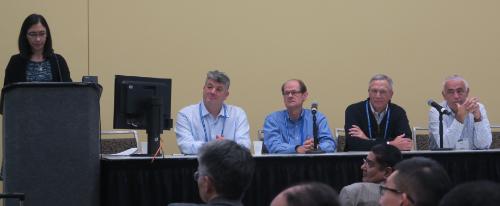November 15, 2017

Developing vaccines for bacterial enteric pathogens poses unique challenges; thus, identification of the correlates of immunity (protection) for individual organisms remains a major goal. Diarrheal diseases continue to have a high burden in developing countries and plague the global health community. Researchers from the Massachusetts General Hospital, PATH, Tel Aviv University, and the Center for Vaccine Development at the University of Maryland School of Medicine joined together at ASTMH to share the state of the science on immune responses to cholera, Enterotoxigenic Escherichia coli (ETEC), Shigella, and Salmonella Typhi (S. Typhi).
While natural infection sometimes results in long-lasting immunity, vaccine development for diarrheal diseases has been slow due to limited efficacy, especially in children under five, and the problematic identification of immunological correlates of protection, which are important for vaccine development and evaluation. According to CVD’s Marcelo Sztein, MD, vaccine development involves a never ending search for the optimal balance between reactogenicity (common, short term adverse effects such as soreness at the injection site) and immunogenicity (positive immune response to the vaccine against the pathogen).
 There are no known immunological correlates of protection against typhoid fever. Researchers at CVD have spent half a century studying typhoid fever and have demonstrated that volunteers immunized with S. Typhi vaccines elicit complex cell-mediated immunity responses. However, the key question remains: Which immunological responses are associated with protection against typhoid fever? The Oxford S. Typhihuman challenge model generated data on the dose required to elicit disease and diagnostics. In addition, this study provided unique insights into human immune responses during the development of typhoid fever and responses which might be associated with protection. For example, these studies allowed the identification of S. Typhi-specific CD8 T cell responses that correlate significantly with clinical outcome after infection; higher responses were associated with protection against typhoid. Multi-functional T cells likely play an important role in the protection against typhoid disease. Regulatory T cells are capable of functionally suppressing S. Typhi responses.
There are no known immunological correlates of protection against typhoid fever. Researchers at CVD have spent half a century studying typhoid fever and have demonstrated that volunteers immunized with S. Typhi vaccines elicit complex cell-mediated immunity responses. However, the key question remains: Which immunological responses are associated with protection against typhoid fever? The Oxford S. Typhihuman challenge model generated data on the dose required to elicit disease and diagnostics. In addition, this study provided unique insights into human immune responses during the development of typhoid fever and responses which might be associated with protection. For example, these studies allowed the identification of S. Typhi-specific CD8 T cell responses that correlate significantly with clinical outcome after infection; higher responses were associated with protection against typhoid. Multi-functional T cells likely play an important role in the protection against typhoid disease. Regulatory T cells are capable of functionally suppressing S. Typhi responses.
Dr. Sztein hypothesized that protection against typhoid requires a balance between effector T cell responses and regulatory T cell responses. If the effector T cell response is too high and regulatory T cell response too low, the end result might be high levels of inflammation; in contrast, if the effector T cell response is too low and regulatory T cell response too high, the end result might be ineffective protection. He further suggested that identifying effective immunological correlates of protection among multiple non-protective or downregulatory immune responses might hold the key for more effective vaccines against typhoid fever.
Contact
Office of Public Affairs
655 West Baltimore Street
Bressler Research Building 14-002
Baltimore, Maryland 21201-1559
Contact Media Relations
(410) 706-5260